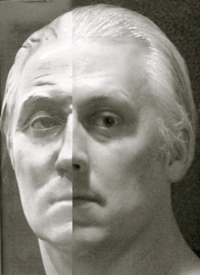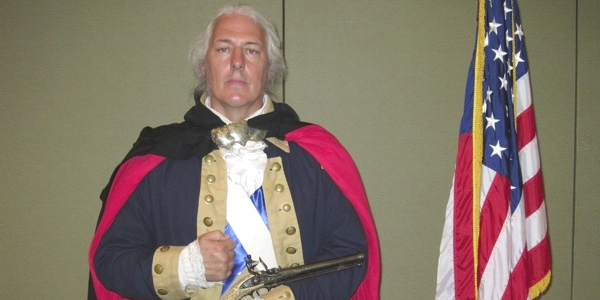
Rev. Mark Collins (left) of Yorktown, Texas, enjoys a national reputation as a portrayer of George Washington. Since July 4, 2002, Rev. Collins has formally played the role of George Washington at numerous historical re-enactments for churches, the military, schools, rallies, political parties, parades, and “home schooling” events (such as “Frontier Days”). Among his film credits, Rev. Collins portrayed George Washington in The Revolution, a 13-hour mini-series for the History Channel in 2006. He has also been cast as George Washington in a soon-to-be released DVD of the documentary entitled “Behold a Pale Horse,” which includes frank assessments of the direction and future of our Republic from several prominent leaders in the “freedom movement.”
The decisive role of earnest prayer answered by God’s Providence was vividly illustrated as the bedrock moral principle in the life of George Washington when Rev. Collins dramatically portrayed General George Washington before the mesmerized attendees of the “Business & Professional” Chapter luncheon meeting of The John Birch Society in Houston, Texas, on Friday, October 21, 2011. This reporter witnessed the noteworthy event.
Rev. Mark Collins certainly fits the part. At about 6’4”, Rev. Collins is approximately the same height as the Father of our Country, and he has an uncanny facial resemblance to Washington, as shown in the “split-face” picture (right) — half from French sculptor Houdon’s physiologically accurate life mask of George Washington, and the other half from Mark Collins. Beyond the physical resemblance, Rev. Collins has deliberately cultivated the known mannerisms and the commanding presence of the Father of our Country, and he has convincingly dressed in the full military uniform of General George Washington, Commander of the Continental Army.
the “split-face” picture (right) — half from French sculptor Houdon’s physiologically accurate life mask of George Washington, and the other half from Mark Collins. Beyond the physical resemblance, Rev. Collins has deliberately cultivated the known mannerisms and the commanding presence of the Father of our Country, and he has convincingly dressed in the full military uniform of General George Washington, Commander of the Continental Army.
Speaking in measured tones, George Washington as portrayed by Rev. Collins proceeded to recount selected highlights from his military career, quoting from recorded statements made by our first president. At age nineteen, Washington (who lived from 1732-1799) was commissioned as a Major in the British colonial Army. At the start of the French and Indian War (1754-1762), Lieutenant Colonel Washington and his men were captured by Indians and informed that they would be executed on the following day. Washington ordered his men to pray, and they did — all night long. The following day, their captors announced their decision to release Washington and his top officers, but to kill all the rest of his men. Washington declined to accept this offer of freedom, and again, he ordered his men to pray, and they did — until the next day, when the somewhat bewildered Indians informed him that they would allow him to leave with all of his men, along with enough provisions to return through the forests to the colonies from whence they came.
This was only the first example of how the prayers of the pious can be answered by our Almighty God.
Looking back over his life, Washington declared that he had even learned how to pray while grasping a sword and taking enemy fire in the seven-and-a-half-hour-long Battle of Monongahela (1755), during which 82 of 83 British officers were killed — all except Washington. “I had two horses shot out from under me. And when I removed my coat afterwards, I found four holes where bullets had passed through my coat, but had left me untouched.” Washington suggested that this example of Divine protection is symbolic of God’s guidance and protection throughout the founding period of the exceptional American experiment in government: “It was Providence – the hand of God – that guided us and protected us.”
What was the secret to Washington’s life of prayer? “My usual regimen was to devote the first and last hour of every day to prayer. I would pray in the morning from 4:00 to 5:00 am, and then from 9:00 to 10:00 pm at night. During the American War for Independence, even on the night before the Battle of Monmouth, I retired from the intense military deliberations of my officers — in order to pray. They knew where I was going — to counsel with the Greatest of Counselors. After prayers, I would return to continue the planning with them through the rest of the night before the battle began.”
“At Valley Forge, when I was losing an average of eleven men per day to starvation, exposure, and disease, I did change my prayer schedule: one hour in the morning, and two hours in the evening.”
 Rev. Collins recounts an event that occurred shortly after the Continental Army won the war with their victory at the Battle of Yorktown, as General Washington attended a celebratory church service in New Jersey. “A young boy asked me, ‘Is that the sword that won the war?’ In response, I asked him if he would like to touch it — and I then guided his hand to rest on the Bible. I tried to explain to him that the Bible is symbolic of God’s guidance and protection, which ensured our recent victory in war.”
Rev. Collins recounts an event that occurred shortly after the Continental Army won the war with their victory at the Battle of Yorktown, as General Washington attended a celebratory church service in New Jersey. “A young boy asked me, ‘Is that the sword that won the war?’ In response, I asked him if he would like to touch it — and I then guided his hand to rest on the Bible. I tried to explain to him that the Bible is symbolic of God’s guidance and protection, which ensured our recent victory in war.”
What kind of human beings will turn to God for help in order to win a war? According to Washington, “It takes a remnant. [For example, only] fifty-six men wrote the Declaration of Independence. At that time, only one-third of the colonists were loyal to America. Another third were still loyal to the British Crown. The last third were — neutral. During the American War for Independence, only two percent of the entire population fought for our freedom. That small remnant of the population, including the Founding Fathers, were patriarchs — a word that comes from the same root as the word ‘patriot’ — and these patriarchs were willing to protect and provide for their country, to give sacrificially for our freedom.”
What is the task that has been assigned for today’s “remnant”?
In his concern for our country, Rev. Collins’s “Washington” asserted that he had been keeping an eye on successive generations of Americans. “There was what you have called ‘Generation X’ – or ‘Gen X’ for short — which was followed by ‘Gen Y.’ And now, we are faced with the next generation — which I call Generation Zero. This generation is bankrupt — economically, socially, spiritually, and educationally. Our task is to change the name of this generation to ‘the blessed generation.’ ”
All of the Founding Fathers shared Washington’s concern with posterity. And as the new Washington points out: “Posterity — those not yet born — that’s you.” According to Washington, John Adams addressed us figuratively as follows: “Posterity! You will never know how much it cost the present Generation to preserve your Freedom! I hope you will make good use of it. If you do not, I shall repent in Heaven, that I ever took half the Pains to preserve it.”
Washington (as portrayed by Rev. Collins) continues:
“Above all, it is essential that the patriots of today’s remnant do not subvert the twin pillars of morality and religion, as I made very clear in my Farewell Address upon leaving office. The educational efforts of The John Birch Society illustrate that it is possible to educate our fellow citizens in this essential patriotism for the sake of our posterity. However, while the educational efforts of The John Birch Society show that the pen is more powerful than the sword … even greater than the pen is … prayer.”
Washington respectfully exhorted his posterity to “be that patriotic remnant, [and to] give sacrificially.” Washington concluded his speech with some poetry that his mother had taught him. The familiar beginning lines are similar, but not identical, to those of “The Winds of Fate,” by Ella Wheeler Cox. Moreover, in Washington’s poem, there is no mention of fate, but rather an emphasis on the choices that are made by men over time:
One ship goes east, another west
By the self-same winds that blow.
’Tis the set of the sail and not the gale
That determines the way they go.
. . .
The waves of the sea are as the passage of time.
As we voyage along through life
’Tis the set of the soul that determines the goal
And not the calm or the strife.
Almost as in a fervent prayer, Rev. Collins’s Washington concluded, “May you set the course for your posterity…. We need new patriarchs…. We were the founding fathers, [but] our nation must have sustaining fathers if our freedoms are to be passed to your posterity.”


